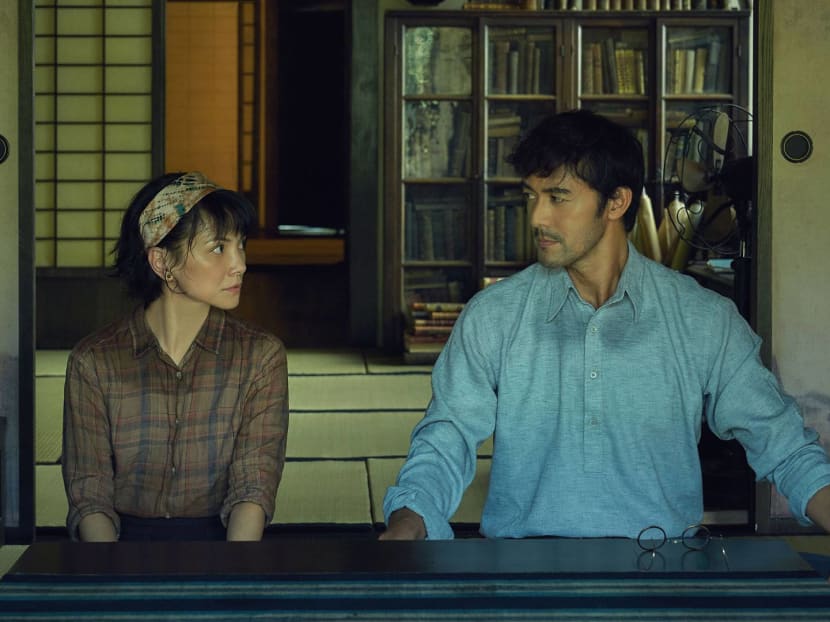The Garden Of Evening Mists Review: Angelica Lee Searches For Love And Landscaping Tips In Enigmatic Drama Set In Post-WWII M'sia
The shot-in-Malaysia film won a Golden Horse Award for Best Makeup and Costume Design.
Starring Angelica Lee, Sylvia Chang, David Oaks, Hiroshi Abe, John Hannah
Directed by Tom Lin Shu-Yu
Up in the lush green hills of Cameron Highlands in Malaysia, secrets and mysteries are shrouded by the enveloping mists. To such an extent that this fog makes the genteelly titled The Garden of Evening Mists a sparse, slow and ultimately quizzical drama to sit through. You need to grasp at its dusky, numbing haze to find its very elusive meaning.
The best word to describe this screen adaptation of acclaimed Malaysian author Tan Twan Eng's 2012 Booker Prize-nominated novel is “inscrutable”. The best person to encapsulate “inscrutable” in this essentially Malaysian tale is the central character of Nakamura Aritomo (Hiroshi Abe).
He's an enigmatic Japanese gardener left over from World War II who, post-war, resides in his own Japanese-style hideaway up in the Highlands. He’s so renowned as an ex-imperial landscaper of the Japanese emperor that a Malayan/Malaysian woman, Teoh Yun Ling (Sylvia Chang plays the older version while Angelica Lee, in a Golden Horse Award-nominated performance, handles the younger one), seeks him out on a personal quest to fulfill her late sister's wish.
Her younger sibling, Yun Hong (Serene Lim), was brutally raped and killed while both were prisoners tortured by Japanese occupation soldiers, Nakamura's cruel countrymen. But despite this, the terribly abused Yun Hong still ironically loved pristine Japanese gardens and dreamed of building one while in captivity.
Now, this double label of Yun Ling's nationality is due to the story switching back and forth among three differing and defining timelines in Malaysia's turbulent history.
In independent Malaysia of the 1980s, Yun Ling, previously a lawyer in the War Crimes Tribunal, is being nominated for a Supreme Court judgeship just as questions about her relationship with an alleged Japanese wartime spy — namely, Nakamura — swirl.
The plot segues into still-violent 1950s Malaya when she first encounters the surly, reclusive foreigner in his hillside solitude and eventually becomes his lover in a sort of paradoxical reconciliation of former foes.
The enemy in this period has changed to the communist insurgents in the jungle, primarily ruthless and hungry Chinese guerillas. They fight the hated British, now returned to power as colonial masters, and hunt for Yamashita's gold, the fabled treasure purportedly looted from their land during WWII.
These two eras are mixed in with flashbacks of the sisters' traumatic time in the Japanese prison camp where the ill-fated Yun Hong keeps their hopes up by telling her older sis about her singular passion through locked cages. “I'm in love with the garden, not the maker,” she explains her gentle, unprejudiced soul.
Prejudice, hatred and distrust of enemies and occupiers, both Asian and Western, and with them, the adjoining antidotes of forgiveness and reconciliation, are, presumably, among the themes explored in the book.
But in this film, by Taiwanese helmer Tom Lin Shu-Yu (Zinnia Flower), they are lost in its trying, languorous pace and, despite so much time spent on the relationship between the two leads, sidetracked by a general lack of explanation with the audience given little help in figuring things out themselves.
It doesn't help that a key character — a tea plantation owner named Magnus Gemmell (John Hannah) — has apparently been changed from a resentful anti-Britisher in the novel to a docile Scot in the movie to extinguish stronger, requisite flames of enmity. Basically, The Garden of Evening Mists is unnecessary complexity hindered by unwieldy simplicity.
What is the primary focus here? Why is the communist insurgency included except, perhaps, to show persistent historical unrest? Is it even important to know who Nakamura really is — was he an enemy or not? — given Yun Ling's propensity to submit quite agreeably to his idiosyncracies?
The man refuses to build her desired garden but instead trains her in the truly tiring art of Japanese rock gardening so that she can build her dead sister's sacred dream herself and lay her ghost to rest. He makes Yun Ling haul huge rocks to various positions before changing his mind while spouting Yoda-ish wisdom in halting English. “To find balance with nature, must first understand nature,” he expounds.
You know there must be something to all this. That there is something profound and edifying to be had about the unseen, unknowable human condition right at the end.
Problem is, the chasm between mystery and discovery is so wide that you lose your memory of purpose and events here just as Yun Ling recalls hers. Plagued by survivor's guilt, she harbours an inner turmoil which the sentient Nakamura tries to allay by somehow inking a giant Yakuza-size tattoo on her entire back.
“For you, only pain feels right,” he elucidates as she recoils from the needle. This sagacious man evidently knows how the audience feels too. (**1/2)
Photo: Cathay Films







